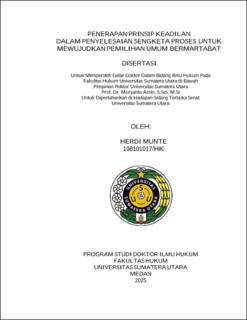| dc.description.abstract | The implementation of simultaneous elections in Indonesia has brought about
significant legal challenges, particularly concerning the principle of justice within the
electoral dispute resolution system. Although elections are normatively based on
fairness and honesty, the reality reveals a disconnection between legal ideals and their
implementation. Institutional fragmentation, overlapping authorities, and inefficient
procedures have led to legal uncertainty and weakened the constitutional rights of
citizens.
This research aims to: (1) analyze the existence of electoral regulations governing the
principle of justice in efforts to realize dignified elections; (2) evaluate the application
of the principle of justice in the resolution of process disputes to achieve dignified
elections; and (3) formulate a redesign of the process dispute resolution system to
maximize the realization of dignified elections.
The method used is normative juridical with qualitative analysis techniques and
literature study, with a statutory, conceptual, historical, comparative law approach and
case studies on the resolution of the 2019 election disputes and studies of judicial
institution decisions.
The results indicate that the current system is procedural, spread across multiple
institutions (KPU, Bawaslu, Administrative Court, DKPP, Constitutional Court,
General Court), and fails to ensure substantive justice. The absence of a unified
electoral judicial body results in case overload, inconsistent rulings, and limited access
to justice for election participants. This study recommends a redesign through the
establishment of an integrated electoral judiciary under one roof, ensuring legal
certainty, efficient procedures, and full protection of constitutional rights. This model
is expected to realize dignified elections based on substantive justice and the
philosophical foundations of Pancasila. | en_US |


